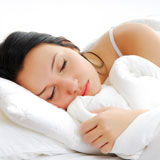Although all of us sleep, few of us really understand the sleep process. It’s like driving a car. Most of us drive, but few of us understand the mechanics of the engine that powers the vehicle. Think of sleep as the engine that powers your body. That is truly what happens. Our bodies require sleep, just as food is required. During sleep, our body performs restorative processes. During sleep, hormones are stimulated that stimulate growth and repair of our body’s tissues. This is also the time when memories are transferred from short-term to long-term. Sleep researchers believe that during sleep the hippocampus and neocortex (which are the two main memory components of the brain) communicate with each other. Short-term memories are stored in the hippocampus and to be retained, these memories must be transferred to the neocortex. There, they are stored as long-term memories. A medical student once told me that the worst exam experience of his life came when he pulled a 17 our day with only 2 hours of sleep before a very important step exam. When the testing started, he completely blanked on the first question. He remembered reading the material at least five times the night before, was what he read was completely gone. This happened on several other questions as well. He knew he read the material but he could not make any connection or link between what he read and the question on the exam. This student learned the hard way, that sleep is necessary to keep his “engine” running properly.
So we know sleep is necessary. So important in fact, that we spend a third of our lives asleep. Research now shows that we need about 9 hours of sleep each night for optimum performance. During this time, our body cycles through 4 different stages of sleep. All these stages are important. The 4 stages of sleep are like a “recipe.” Suppose you are going to bake a cake. You get a recipe and follow it. You may add an extra egg or use a little less sugar, but if you deviate from the recipe too much your results will not be pleasing. This is also true with the stages of sleep. You can get a little less sleep or your sleep may be disturbed by a crying baby occasionally. But, if this happens on a routine basis you begin to experience unpleasant side effects. You will suffer anxiety, stress, and fatigue. In extreme cases hallucinations and delusional behavior are present.
There are two ways to have a sleep deficit. One way is to not get enough hours of sleep, the other is to not get enough of the right stage of sleep. Sleep is comprised of 90 minute repeating cycles four different stages. Let’s talk about what happens in each of these important stages.
Sleep Stages
Stage 1 is a transitional phase. It is considered “light” sleep. People who are in light sleep can be easily aroused and if asked, usually say they were not even asleep. This same stage later cycles into what is called REM (rapid eye movement) sleep. This is the time when dreams occur. Everyone dreams. Research shows that those who do not remember their dreams, can easily recall them if they are awakened during REM sleep. This is the most important phase of sleep. Research subjects who are awakened and not allowed REM sleep suffer the most ill effects. They are extremely fatigued, even if they have had sufficient time in other stages of sleep. They suffer anxiety and stress and those extreme side effects we mentioned earlier- hallucinations and delusional behavior.
Stage 2 lasts about twenty minutes. During this stage your brain waves show rapid bursts of activity known as sleep spindles. Your heart rate and your body temperature begin to drop. Not much is known about what happens during Stage 2. However, stage 2 is the baseline sleep from which all other stages launch.
Stage 3 begins a deeper sleep and the brain transitions into slower delta waves. During this time a person is much harder to arouse. Again, we do not know a lot more about this sleep stage.
Stage 4 is the deepest level of sleep. It is a deep sleep that lasts for about 30 minutes. It is during stage 4 that sleep disorders such as sleepwalking, sleeptalking, and bedwetting are most likely to occur at the end of Stage 4. These behaviors do interrupt the quality of your continued sleep and can lead to sleep deficits.
Sleep Deficits
Sleep deficits can be caused by a variety of factors. There may be environmental issues factors that disturb your sleep. Things like the temperature of the room, obtrusive levels of light, or excess noise may be at fault. Poor quality sleep could also be caused by physical factors. Perhaps you are bothered by physical pain, like that of arthritis. Or, perhaps other physical factors like bed bugs or mosquitoes. Or, perhaps there are other issues, like a blocked airway, that cause disturbances in your sleep.
Scientists talk about Circadian rhythms. This is an internal daily cycle of sleeping and waking controlled by a balance of several hormones. One important hormone is melatonin. Melatonin is produced by the Pineal gland in the brain. It is responsible for inducing drowsiness and sleep. Melantonin puts us to sleep. We can sleep without it, but it is more difficult. The production of melatonin is triggered by darkness. That is why it is so important to sleep in a dark room. Workers who rotate between shift are adversely affected by Circadian rhythms. You body naturally wants to sleep at night and when your body senses darkness melatonin begins to be produced. I know of an ER physician who has to work nights. He tries to trick his circadian rhythm by wearing extremely dark glasses on his way home from work each morning, and by creating absolute dark inside his home. He is convinced that he can manipulate his melatonin levels by only exposing his retina to minimal light immediately prior to trying to sleep. Another option for him, might be to try melatonin supplements. These are available in 1 to 3 gram capsules and are particularly helpful when your body is stressed by travel. It takes about three days for your circadian rhythm to reset itself if you travel into a different time zone. Melatonin supplements are helpful in the short term, but a healthy individual would not want to take them long term. Your body may begin to rely on the supplement and produce less melatonin naturally.
Another important sleep hormone is Cortisol, produced by the adrenal gland. This is known as the “stress hormone” and is triggered by high levels of stress. Your body naturally makes more Cortisol as you handle the everyday stresses of life. Cortisol levels should drop in the evening. High levels of Cortisol continuing into the night can cause sleep disturbances.
No matter what causes your sleep deficit, a continued sleep deficit can cause extreme hardship. Research now shows that you need about 9 hours of sleep or you begin to build up a sleep deficit. You cannot just make it up with one good night of sleep. You have to make it up by getting more sleep over several days. If not, then you begin to suffer ill effects. You lose ability to concentrate. Your memory suffers and you mood changes. Sleep scientist now know that things like hunger and obesity are affected by inadequate sleep, as well and your immune system. You need to get your sleep and catch up if you miss out.
Are You Affected?
There are many different symptom checkers to help you determine if you are sleep deprived. They will ask questions like:
- Is is a struggle for you to get out of bed?
- Do you feel tired, irritable, and stressed out during week?
- Do you have trouble concentrating?
- Do you fall asleep at work, in class, or in warm rooms?
- Do you fall asleep after dinner or while watching TV?
- Do you get drowsy while driving?
- Do you fall asleep within 5 minutes of going to bed?
- Do you need a nap to get through the day?
- Do you have dark circles under your eyes?
If you answer yes to several of these questions, you likely have a sleep deficit. If you cannot easily pinpoint the cause and correct it, you should seek advice from your physician. Your physician can order sleep testing be conducted in a sleep center. Or, another option would be to start with a home sleep study. Many sleep centers will set you up with special recording monitors you can wear in the privacy of your home. These home studies are excellent ways to easily do initial screenings.
Conclusion
Remember, sleep is an essential body function and is a needed fuel for your body. Just like you can’t run your car without gas, you can’t run your body without adequate sleep. Research shows that many people suffer from sleep disorders that compromise the amount and quality of their sleep. Don’t hesitate to seek the advice of your physician. Help is available.

